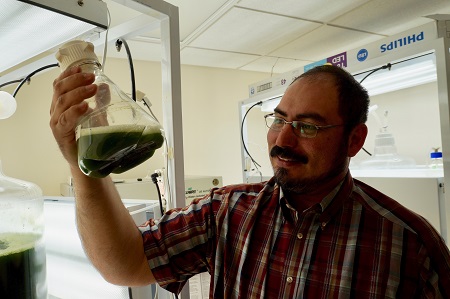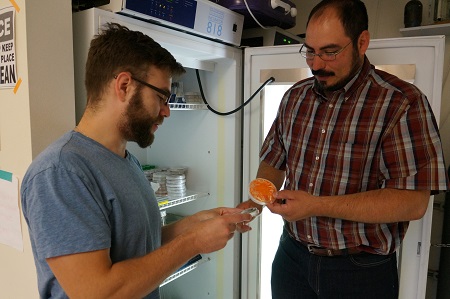 Omar Holguin, an assistant professor in the Department of Plant and Environmental Sciences at New Mexico State University, is researching whether algae could one day take the place of omega-3 supplements that are derived from fish, which feed on algae. Algae may be the real source of high-value products that are beneficial to human health. (NMSU photo by Adriana M. Chávez)WRITER: Adriana M. Chavez, 575-646-1957, adchavez@nmsu.edu
Omar Holguin, an assistant professor in the Department of Plant and Environmental Sciences at New Mexico State University, is researching whether algae could one day take the place of omega-3 supplements that are derived from fish, which feed on algae. Algae may be the real source of high-value products that are beneficial to human health. (NMSU photo by Adriana M. Chávez)WRITER: Adriana M. Chavez, 575-646-1957, adchavez@nmsu.edu
An assistant professor at New Mexico State University is looking into whether algae could one day take the place of your daily omega-3 supplements that are derived from fish, which feed on algae.
 Omar Holguin, right, an assistant professor in the Department of Plant and Environmental Sciences at New Mexico State University, shows a sample of a stressed algae specimen to doctoral student Michael Canton in his lab at Skeen Hall. Holguin's students are researching whether pigments derived from algae can be used in cosmetics. (NMSU photo by Adriana M. Chávez)Algae may be the real source of high-value products that are beneficial to human health, said Omar Holguin, an assistant professor in the Department of Plant and Environmental Sciences at NMSU's College of Agricultural, Consumer and Environmental Sciences.
Omar Holguin, right, an assistant professor in the Department of Plant and Environmental Sciences at New Mexico State University, shows a sample of a stressed algae specimen to doctoral student Michael Canton in his lab at Skeen Hall. Holguin's students are researching whether pigments derived from algae can be used in cosmetics. (NMSU photo by Adriana M. Chávez)Algae may be the real source of high-value products that are beneficial to human health, said Omar Holguin, an assistant professor in the Department of Plant and Environmental Sciences at NMSU's College of Agricultural, Consumer and Environmental Sciences.
"Algae produce oil, and fish eat algae," Holguin said. "My research project focuses on whether algae could be a source of polyunsaturated fatty acids."
The American Heart Association recommends the consumption of polyunsaturated fatty acids, or PUFAs, to prevent heart disease, but most of the human dietary sources of PUFAs are derived from fish and fish oil. However, because of the accumulation of toxins in the environment, the composition of fatty acids in fish oil may not be consistent. Also, the decline in wild fisheries means there may not be sufficient sources of PUFAs for an increasing human population, Holguin said.
In the past, Holguin has received grants from the U.S. Department of Health and Human Services National Institutes of Health to fund his research into algae and PUFAs. Microalgae are sources of a variety of beneficial metabolites including fatty acids, Holguin said. Microalgae are capable of synthesizing and accumulating PUFAs, making them an alternative source for dietary supplements.
Holguin's background includes research into algae as a biofuel and analyzing phytochemicals. Holguin, who is originally from Los Lunas, New Mexico, graduated from NMSU in 2002 with a bachelor's degree in environmental science. He went on to earn his master's and doctoral degrees in plant and environmental sciences, both also from NMSU. His father, Francisco Holguin, was the Extension agent for Valencia County for 20 years.
"One of Dr. Holguin's many contributions to the department is his excellent mentorship of undergraduate and graduate students," said Rolston St. Hilaire, head of the Plant and Environmental Sciences department. "He is actively training the next generation of scientists. Dr. Holguin contributes to our overall knowledge of the biochemistry behind natural product synthesis in microorganisms and higher organisms."
Holguin is guiding student research into whether algae could also be a good source of pigments that could be used in cosmetics, in response to an increasing demand for vegan cosmetics. Several types of algae sourced from samples at Yellowstone National Park are being grown in Holguin's lab on the NMSU campus in various brilliant colors, including red, green and blue.
"Dr. Holguin guided us at every single step in our research. He helped in troubleshooting many scientific problems and walked us through the problem step-by-step," said Saba Gill, a plant and environmental sciences graduate student working with Holguin on algae research. "Dr. Holguin always keeps us motivated in the lab by visiting us on a daily basis and inquiring about ongoing experiments in the lab. He always says to us, 'Work, work and work until you get what you are looking for.' Under his kind supervision, now I have this habit that I don't overlook very trivial details of my experiment because later on, that can become something bigger. It is really an honor for me to work with him."
"Algae is the new Amazon," Holguin said, referring to the vast and biodiverse rainforest that covers most of South America. "Researchers are constantly isolating novel strains of algae."